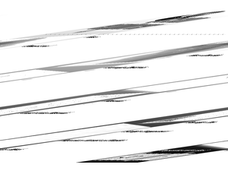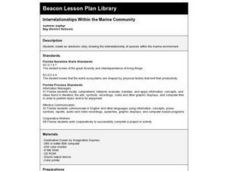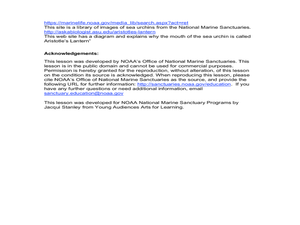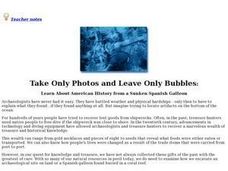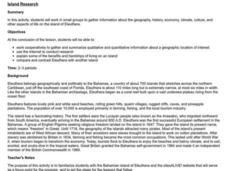Curated OER
Aquatic Ecosystems
Ninth graders record information on aquatic ecosystems and create a labeled diagram of an ecosystem of their choice. They can choose from an ocean zone, estuary, river, lakes, or beaches. The student has to explain their biome of choice.
Curated OER
Now, Take a Deep Breath
High schoolers define several laws of pressure and see how they relate to scuba diving. In this ocean explorer lesson students answer questions and complete an activity.
Curated OER
What Does it Take to be a Survivor: Part 2
Students explore adaptation by completing worksheets. In this fish anatomy lesson plan, students identify the different survival strategies fish utilize to live in the ocean and the adaptation their bodies have gone through over millions...
Curated OER
Biomes: Islands and Evolution
Students discover how islands form, how plant and animal species get there and what the term means. In this biomes activity students prepare a presentation that describes the life forms and geography of an island.
Curated OER
What Was for Dinner?
Young scholars examine energy obtaining strategies that are used by organisms in deep reef communities. In this ocean lesson students complete an isotope activity.
Curated OER
Great Blobs of Jelly!
Students explain how zoo-plankton have an impact on the global process. In this ocean zoo-plankton lesson students calculate carbon flux and plankton densities.
Curated OER
Camouflage, Protection, & Adaptations—Who am I?
Students explore ocean animal adaptations. In this animal adaptations lesson, students examine how different ocean animals use adaptations other than camouflage to protect themselves.
Curated OER
Where's the Oxygen?
Students study seawater and how temperature and salinity influence it. In this oxygen lesson students complete a lab activity on dissolved oxygen.
Curated OER
Interrelationships Within the Marine Community
Fourth graders create an electronic story showing the interrelationship of species within the marine environment. They utilize the educational software, 'Destination Ocean' during this engaging lesson.
Curated OER
Sea Urchins - Diadema Antillarum
Students investigate oceanography by painting sea life. In this crustacean lesson, students identify sea urchins in our ocean environments and describe the functionality of their spherical-shaped bodies. Students design their own sea...
Curated OER
Sea Connections
Students, after locating different marine habitats on a globe, play a card game about ecosystems, food webs and organisms.
Florida International University
The Good, the Bad and the Nasty Tasting
Examine the benefits of chemical defense mechanisms. Organisms in oceans use chemicals to ward off predators. Duplicate this adaptation using a hands-on experiment in which you ward off your predators (your pupils) with some...
Teach Engineering
Extinction Prevention via Engineering
It's time to save endangered species through engineering. The third lesson in a nine-part Life Science unit has young environmentalists study species extinction. An engaging discussion leads to some ideas on how to use engineering design...
American Museum of Natural History
What's the Big Deal About Water?
It may seem simple, but water is one of the most unique substances on Earth. An interactive online lesson describes its properties and importance in so many different situations. Learners interact with the lesson to learn the role water...
Curated OER
Biology Jeopardy
Play Jeopardy as you review what might possibly be an entire year's high school biology course! The vast variety of questions requires that you read through the slides to make sure that they all relate to your curriculum. You could make...
Curated OER
Cutt-Off Genes
High schoolers explore how gene sequence analysis can be used to examine phylogenetic similarities of different organisms. Students work in groups to simulate a gel electrophoresis separation of fragments using poster board to create...
Curated OER
Ecosystem Interdependence
Learners outline a scenario demonstrating ecosystem interdependence. They explain the effects of this change according to the food web. They give a positive example such as increased rain and have the students call out answers to your...
Curated OER
Take Only Photos and Leave Only Bubbles: Learn About American History from a Sunken Spanish Galleon
Young scholars simulate the research process of investigating a shipwreck. In small groups, they conduct Internet research, and develop and write a proposal for excavation of the archaeological site.
Curated OER
Island Research
Young scholars will work in small groups to gather information about the geography, history, economy, climate, culture, and other aspects of life on the island of Eleuthera. Lesson contains adaptations for all levels.
Curated OER
Sprinkles 5
For this environment worksheet, students read the information and complete the survey about their own local habitats and some of the others in Florida.
Curated OER
Habitats
Second graders identify characteristics of various habitats. In this habitats lesson, 2nd graders read Where the Forest Meets the Sea and Swimmy to identify the settings of different habitats. Students construct murals of different...
Curated OER
Fish Fashion 101
Students explore fish anatomy. In this fish anatomy and adaptation lesson, students define and identify the location of fish body parts. Students add these parts of a fish's anatomy to a life-sized fish costume worn by a student. ...
NOAA
Individual Species in the Deep Sea
A tube worm's outer covering is made of chitin, the same material that makes up the shells of lobsters and crabs. Scholars create tube worms and analyze and discuss the longevity of organisms living near cold seeps. They then discuss and...
Curated OER
Over and Through Information Sheet
Eager earth scientists practice using vocabulary related to landforms and bodies of water. On the first page they categorize the terms and form sentences with them. Then, they test their knowledge with twenty-five multiple-choice...



